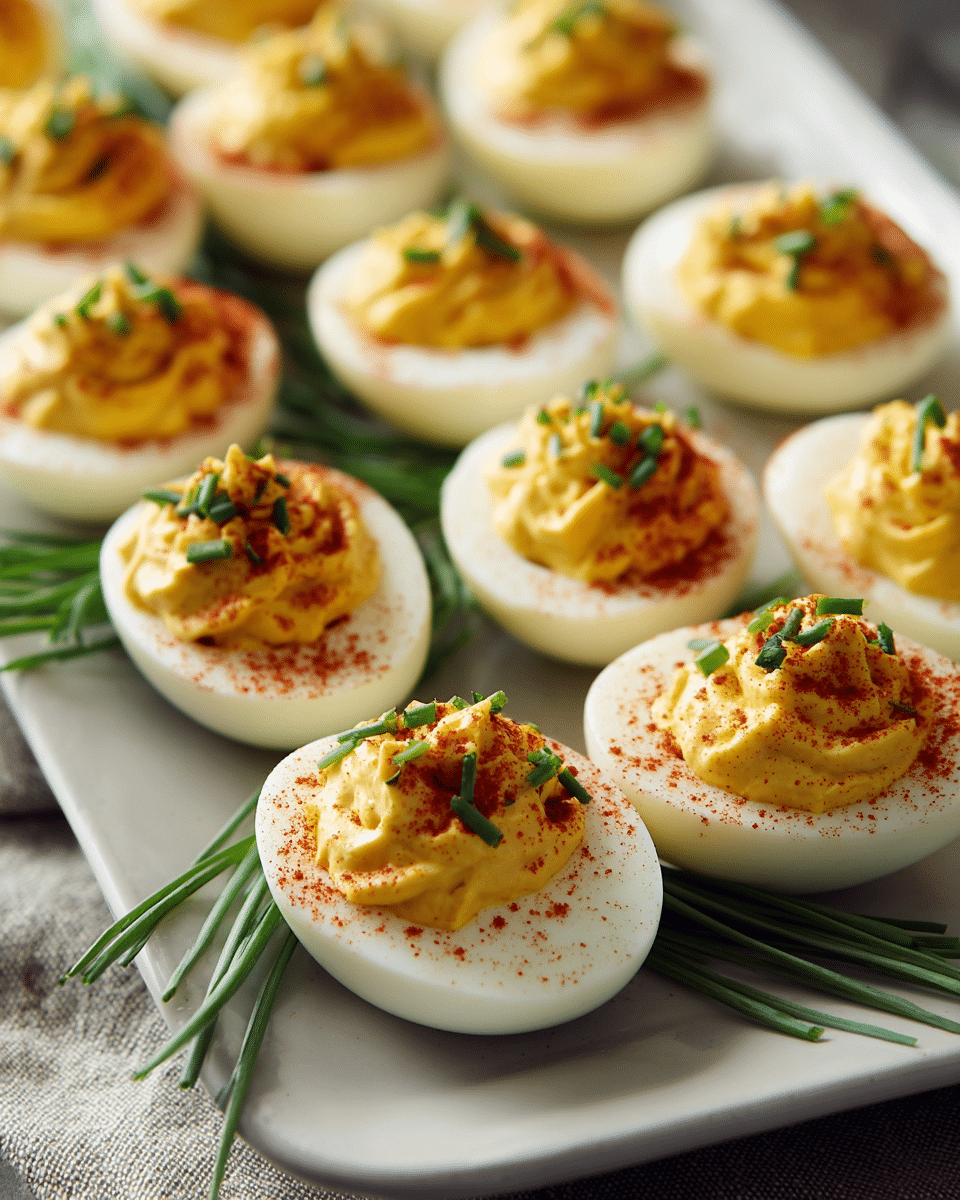Deviled eggs are a staple at any festive gathering, and they shine especially bright during Labor Day cookouts. With their creamy, tangy filling and classic seasoning, these bite-sized delights are the perfect make-ahead appetizer that always disappears fast. Whether served on a rustic picnic table or passed around at an upscale party, these deviled eggs bring nostalgic comfort and crowd-pleasing flavor in every bite.
FULL RECIPE
Ingredients
- 12 large eggs
- 1/2 cup mayonnaise
- 2 teaspoons yellow mustard
- 2 teaspoons white vinegar
- 1/4 teaspoon salt
- 1/4 teaspoon ground black pepper
- Paprika, for garnish
- Chopped fresh chives or parsley (optional, for garnish)
Directions
- Place eggs in a large saucepan and cover with cold water by about an inch.
- Bring water to a boil over medium-high heat. Once boiling, cover the pot, turn off the heat, and let the eggs sit for 10–12 minutes.
- Drain and transfer the eggs to a bowl of ice water. Let them cool for at least 5 minutes.
- Gently crack and peel each egg, then slice in half lengthwise.
- Carefully remove the yolks and place them in a medium bowl. Set the egg whites aside on a serving platter.
- Mash the yolks with a fork until no large lumps remain.
- Add mayonnaise, mustard, vinegar, salt, and pepper to the yolks. Mix until smooth and creamy.
- Spoon or pipe the filling evenly into the egg white halves.
- Lightly sprinkle paprika on top of each deviled egg. Garnish with chopped chives or parsley if desired.
- Refrigerate for at least 30 minutes before serving to allow flavors to meld.
Nutrition Facts
- Calories: 65
- Total Fat: 5.5g
- Saturated Fat: 1.3g
- Cholesterol: 95mg
- Sodium: 105mg
- Total Carbohydrates: 0.4g
- Dietary Fiber: 0g
- Sugars: 0.2g
- Protein: 3g
History and Popularity of Deviled Eggs
Deviled eggs have a long-standing history dating back to ancient Rome, where boiled eggs were seasoned and served as appetizers. Over time, this simple dish evolved, and the “deviled” term became popular in the 18th century to describe spicy or seasoned dishes. Today, deviled eggs are a beloved classic in American cuisine, especially during holidays and celebrations like Labor Day. Their creamy texture and tangy flavor make them a crowd-pleaser at picnics, potlucks, and family gatherings.
Nutritional Profile and Health Benefits
Deviled eggs provide a good source of high-quality protein, which is essential for muscle repair and overall body function. Eggs contain essential vitamins like B12, vitamin D, and minerals such as selenium and choline, which support brain health and metabolism. However, because deviled eggs include mayonnaise, they also have a higher fat content. Using lighter mayonnaise or Greek yogurt alternatives can make the dish healthier without sacrificing creaminess.
Customization and Flavor Variations
One of the best things about deviled eggs is their versatility. Classic recipes can be easily adapted by adding ingredients like avocado for a creamy twist, smoked paprika for smoky flavor, or even crispy bacon for added texture. Herbs such as dill, tarragon, or chives bring freshness, while spicy elements like Sriracha or horseradish can give the filling a kick. These variations allow home cooks to tailor the dish to different taste preferences and occasions.
Serving Suggestions for Labor Day and Beyond
Deviled eggs are perfect finger food for any gathering. They can be arranged on a platter alongside fresh vegetables, pickles, and cheeses for a beautiful appetizer board. For Labor Day picnics, serve them chilled in a portable container to keep them fresh and safe. They also pair wonderfully with other classic dishes like grilled meats, coleslaw, or potato salad, making them a versatile addition to your holiday spread.
Tips for Perfectly Cooked Eggs
The texture of the yolk filling depends heavily on perfectly cooked eggs. Overcooked eggs can develop a greenish ring around the yolk and a sulfurous smell, while undercooked eggs might be too soft to handle. The best method is to bring eggs to a boil, then let them sit off heat for about 10-12 minutes, followed by an ice bath to stop cooking. This technique yields firm whites and creamy yolks, ideal for deviled eggs.
Storage and Food Safety
Because deviled eggs contain mayonnaise and eggs, they should be stored in the refrigerator and consumed within 2-3 days for optimal freshness and safety. It’s best to prepare deviled eggs the same day they will be served, or at most the day before. When transporting for picnics or outdoor parties, use a cooler with ice packs to keep them chilled and safe from bacterial growth.
Presentation and Garnishing Ideas
Presentation plays a big role in making deviled eggs appealing. Beyond a simple sprinkle of paprika, garnishing with fresh herbs like parsley or chives adds vibrant color and fresh aroma. Some chefs also use small slices of olives, capers, or even edible flowers to elevate the visual appeal. Using a piping bag to fill the eggs creates a professional look, with smooth, decorative swirls that invite guests to dig in.
Pairing Deviled Eggs with Drinks
Deviled eggs complement a wide variety of beverages. Their creamy richness pairs well with crisp white wines like Sauvignon Blanc or sparkling wines that cut through the fat. For beer lovers, light lagers or pilsners work nicely, offering a refreshing balance. At casual Labor Day gatherings, classic iced tea or lemonade also complements the flavors and keeps the meal refreshing and light.
Dietary Considerations and Adaptations
While traditional deviled eggs are not suitable for vegan diets, they can be adapted using plant-based ingredients such as tofu or chickpeas for the filling. For those avoiding dairy or certain allergens, mayonnaise alternatives and careful ingredient selection can make this appetizer accessible. Additionally, reducing salt or using low-fat mayo can help meet dietary needs without losing the dish’s signature taste.
Cultural Variations of Deviled Eggs Worldwide
Though a classic American staple, deviled eggs have variations across different cultures. For example, in some European countries, deviled eggs may be flavored with horseradish or mustard, while in Latin America, they might be topped with spicy salsas or fresh cilantro. Exploring these international twists can inspire new versions of the recipe, broadening the culinary experience while keeping the core concept intact.
Conclusion
Labor Day deviled eggs are much more than a simple appetizer; they embody a tradition of celebration, community, and culinary creativity. Their rich history, nutritional benefits, and endless adaptability make them a reliable favorite at any gathering. Whether enjoyed in their classic form or customized with modern twists, deviled eggs continue to delight taste buds and bring people together, making them an essential dish for your holiday table and beyond.






